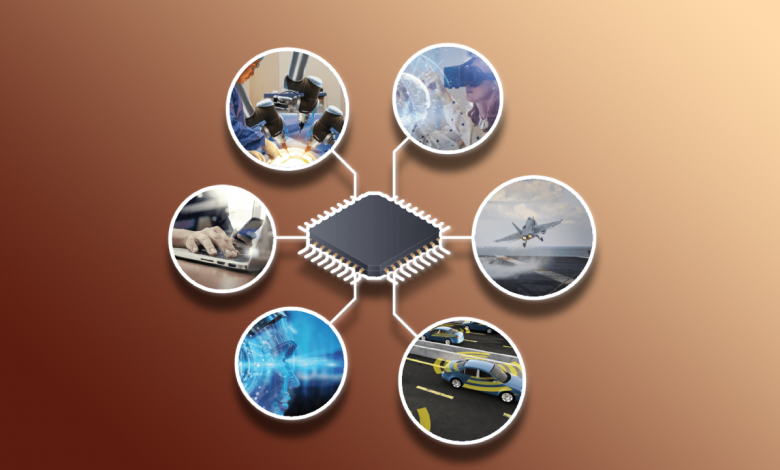Significance of the Semiconductor Industry

[GS Paper 2 – International Relations]
Context – Recently, the United States has banned the sale of advanced computer chips to China in line with the series of efforts to limit China’s military and technological ambitions.
This ban on the sale of advanced computer chips to China is the most significant action taken by the US Government against China in decades. The decision has been curated to cut off the supplies of critical technology to China that may be used across sectors which includes that of advanced computing and weapons manufacture.
Implications of the Ban
- The USA has sighted the pretext of strategic advantage in critical technological sectors behind the move which may prompt other nations of the world to follow the same. Such a situation in times to come will develop into an intense trade war. A trade will ultimately impact the reliability of global trading and financial order.
- The move to ban the export of the advanced computer chips may adversely impact other countries devoid of potential benefits.
- These sanctions will be creating immense uncertainty in global supply chains. Countries like India may look to make good gains from the move by the USA but these gains can be hugely diminished by the cumulative uncertainties in the world trading systems.
- Climate Change is one of the principal spheres which requires unconditional global cooperation. It becomes quite difficult to imagine credible efforts towards global climate change when the superpowers are indulged in a mercantile war.
About Semiconductor Chips
- Semiconductors are the type of materials which have a conductivity between the conductors and insulators. Such materials may include pure elements, silicon or germanium compounds, gallium, arsenide or cadmium selenide.
- Semiconductors are the basic building blocks which serve as the heart and brain of all the modern electronics, information and communication devices. These chips have now also become the integral part of contemporary automobiles and household devices.
- The COVID-19 pandemic pushed the majority of daily activities to online and this has highlighted the importance of chip-powered computers and smartphones in people’s lives.
Significance
Semiconductors are pivotal to all the major sectors of the economy including aerospace, automobiles, communications, clean energy, IT and medical devices.
The Indian Govt. in December 2021 had sanctioned 76,000 crore under the PLI Scheme to encourage the manufacturing of various manufacturing goods within the country.
Display and semiconductor-driven devices are the foundation of modern electronics driving the next phase of digital transformation under the Industrial Revolution 4.0.
Need for Promotion of Semiconductor Industry
- Semiconductor chips are the prime drivers of Information and Communication Technology (ICT) development and also one of the key reasons behind the current flattening of the world.
- They have their importance and utility in critical infrastructures including communications, power transmission among others and this has a direct bearing for national security.
- Promotion of the semiconductor industry and display ecosystem will have a multiplier effect across various sectors of the economy with deeper integration to the global value chain provided there are not many countries in the world that manufacture these chips.
- The Semiconductor Industry is presently dominated by Taiwan, USA, South Korea , Japan, Netherlands and Germany only.
India’s Status in Semiconductor Market
- India,at present is importing all chips from outside and the market is estimated to be worth around $100 billion by 2025 from $24 billion at present.
- Apart from the PLI Scheme, the Union Cabinet has also launched the SPECS (Scheme for Promotion and Manufacturing of Electronics Components and Semiconductors).
- The Ministry of Electronics and Information Technology (MeitY) has launched the Design Linked Incentive Scheme (DLI) with an objective to nurture nearly 20 domestic companies involved in semiconductor design while also facilitating them to achieve a turnover of more than 1500 Crore in the next five years.
Challenges for India
- The Semiconductor Industry is a very complex and technology-intensive sector requiring high investments, long gestation and payback periods while rapid changes in technology requires sustained and significant investment.
- The current level of fiscal support from the government for the semiconductor industry is quite miniscule considering the scale of investments required.
- Although India possesses decent chip design talent but it lacks chip fabrication capacities. ISRO and DRDO have their own fabrication units, but they are established for their own requirements while also being not that technologically advanced when compared to other countries.
- The Chip Fabrication units are also thirsty units which require millions of liters of clean water, extremely stable water supply and a lot of skilled workforce.
Conclusion
There is a growing demand of semiconductors globally which can be catered by India for which India would require to build upon the existing capabilities, robust po0licy mechanisms and ecosystems in place. The need of the hour is also for the Government to work closely with Industry players.





.png)



